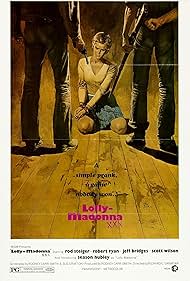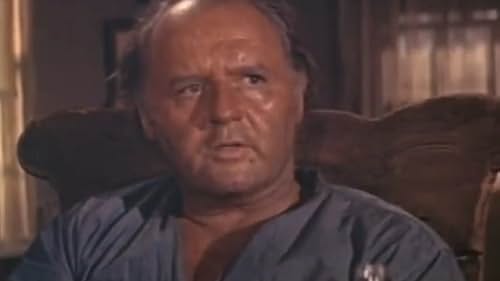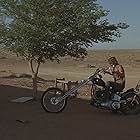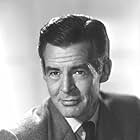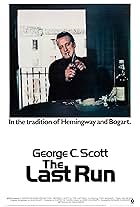In the early 1970s, a young woman passing through rural Tennessee unintentionally gets caught in a feud between two local neighboring clans, the Feathers and the Gutshalls.In the early 1970s, a young woman passing through rural Tennessee unintentionally gets caught in a feud between two local neighboring clans, the Feathers and the Gutshalls.In the early 1970s, a young woman passing through rural Tennessee unintentionally gets caught in a feud between two local neighboring clans, the Feathers and the Gutshalls.
Kathy Watts
- Lyda Jo Gutshall Feather
- (uncredited)
Storyline
Did you know
- TriviaBased on the 1969 novel, "The Lolly Madonna War," by Sue Grafton, author of the popular "alphabet mysteries" featuring hard-boiled female Private Investigator Kinsey Millhone. The twelfth installment, "'L' is for Lawless," was published in the United States in 1995.
- Quotes
Sister E. Gutshall: [to Hawk's made-up face] Indian chief my foot! You look like a shitty little queer!
- Alternate versionsThe film originally received an "R" rating from the MPAA due to the violence, which was later trimmed to receive a "PG" rating. The details removed from the "R" version include a brief Season Hubley nude scene, and "toning down" of the violence, especially the scene in which "Laban" kicks "Thrush" to death. Most critics saw the "R" version.
- ConnectionsFeatured in The Moviemakers (1973)
Featured review
This one starts out like the distant inbred cousin of Deliverance from West Virginia come out on the porch to play the banjo. A menacing beat-up flatbet truck runs circles around a girl killing time in a remote bus stop on her way to Nashville. There's promise of backwoods squalor and meanness and the delivery of it, not exploitation graphic and gratuitous but it's there, the passerby girl is snatched, another girl is raped, a moonshine still is busted, and a backwoods yokel with painted eyes and a bra makes a scene. At that point the Feathers family appears to be only a few generations of inbreeding away from moving down to Texas to make lampshades out of human skin and chase Marilyn Burns with a buzzing chainsaw.
Then, as the two feuding families headed by patriarchs Rod Steiger and Robert Ryan begin to spar about stolen hogs and a postcard written to one Lolly-Madonna and a grassy meadow that at one time belonged to one or the other family, something begins to change like a dark cloud passes over the movie. It's not about the futile anguish and madness of vendetta, although it seems so at first. And it's not about hogs or the grassy meadow or even land as a basic abstraction and what it's come to signify for people who had nothing to call their own for generations but land. It's about the creeping realization of a broken life muttering to itself late at night on a rocking chair by the window that "it's too late", that it's too late not for killing and dying but for even words.
It's about something that happened long ago which can't be made right again, and it has something to do with a son who never came back from the war, about brothers who can never measure up to that son who never came back from the war because they stayed behind, about a dead wife who was more important to the father-in-law than the son who lost her, that much more important that the father-in-law had to sacrifice that which was the most important thing in the life of the other son (the one who never amounted much for anything) to repudiate the killing. And about horses. It's about bitter regret pain and anguish gnawing at the insides and then the grassy meadow is set on fire and the two families meet for a standoff outside the old rundown Feathers home, once probably elegant with wealth happiness and good fortune.
In the end, the look on Rod Steiger's eyes turns from anger and sadness to complete madness and Sarafian gives us freeze frames of the main characters that look like portraits of despair, the colors are drained out and the movie turns sepia yellowish as if in memory of something lost, of that small insubstantial detail that involved horses and the dead wife that was the result not of practical design or coincidence but of the pure blind chance of the cointoss that forever changed the lives of two families. Immense sadness. Or like William Faulkner would say, between grief and nothing, Lolly-Madonna XXX will choose grief.
Then, as the two feuding families headed by patriarchs Rod Steiger and Robert Ryan begin to spar about stolen hogs and a postcard written to one Lolly-Madonna and a grassy meadow that at one time belonged to one or the other family, something begins to change like a dark cloud passes over the movie. It's not about the futile anguish and madness of vendetta, although it seems so at first. And it's not about hogs or the grassy meadow or even land as a basic abstraction and what it's come to signify for people who had nothing to call their own for generations but land. It's about the creeping realization of a broken life muttering to itself late at night on a rocking chair by the window that "it's too late", that it's too late not for killing and dying but for even words.
It's about something that happened long ago which can't be made right again, and it has something to do with a son who never came back from the war, about brothers who can never measure up to that son who never came back from the war because they stayed behind, about a dead wife who was more important to the father-in-law than the son who lost her, that much more important that the father-in-law had to sacrifice that which was the most important thing in the life of the other son (the one who never amounted much for anything) to repudiate the killing. And about horses. It's about bitter regret pain and anguish gnawing at the insides and then the grassy meadow is set on fire and the two families meet for a standoff outside the old rundown Feathers home, once probably elegant with wealth happiness and good fortune.
In the end, the look on Rod Steiger's eyes turns from anger and sadness to complete madness and Sarafian gives us freeze frames of the main characters that look like portraits of despair, the colors are drained out and the movie turns sepia yellowish as if in memory of something lost, of that small insubstantial detail that involved horses and the dead wife that was the result not of practical design or coincidence but of the pure blind chance of the cointoss that forever changed the lives of two families. Immense sadness. Or like William Faulkner would say, between grief and nothing, Lolly-Madonna XXX will choose grief.
- chaos-rampant
- May 1, 2010
- Permalink
- How long is Lolly-Madonna XXX?Powered by Alexa
Details
Contribute to this page
Suggest an edit or add missing content

